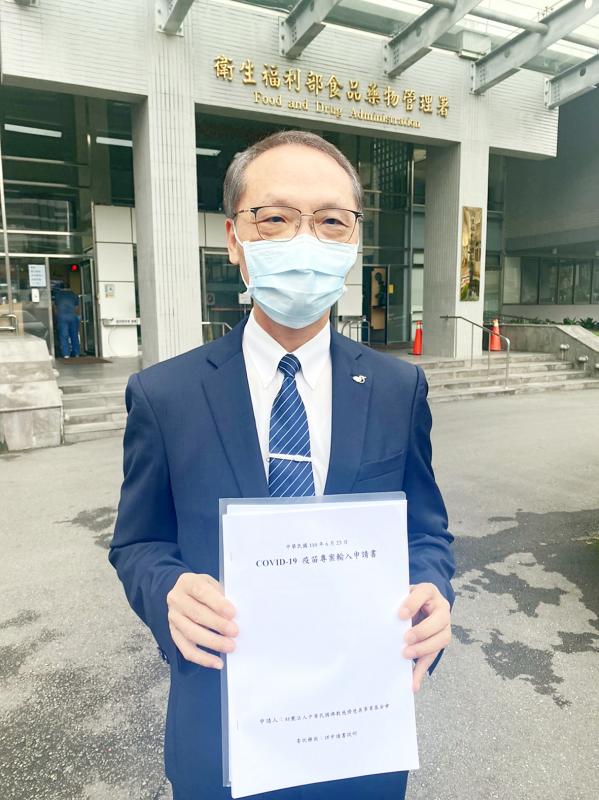The Buddhist Compassion Relief Tzu Chi Foundation’s application to import 5 million doses of the BioNTech COVID-19 vaccine will not be considered alongside similar requests tendered by the Yonglin Foundation and Taiwan Semiconductor Manufacturing Co (TSMC) due to differences in their applications, Executive Yuan spokesperson Lo Ping-cheng (羅秉成) said yesterday.
The Tzu Chi Foundation on Wednesday submitted an application to the Food and Drug Administration (FDA), after the Executive Yuan on Friday last week authorized the YongLin Foundation and TSMC to represent the government to purchase vaccines from BioNTech.
After evaluations, the proposals by TSMC and the YongLin Foundation are more feasible and have a greater “chance” of success, Lo told a news conference at the Executive Yuan in Taipei.

Photo courtesy of the Buddhist Compassion Relief Tzu Chi Foundation
The Tzu Chi Foundation’s application is not being merged with the other two due to differences with each application, he said, without elaborating.
International purchases of vaccines are complicated and it is vital to develop a model that has a greater chance of success, Lo said.
None of the applications included an “authorization notice” from the original manufacturer, BioNTech.
It is rare that the first tender of an application includes a manufacturer’s authorization, FDA Director-General Wu Shou-mei (吳秀梅) said on Wednesday, adding that it would look into the Tzu Chi Foundation’s application and ask it to provide any missing documents.
The Tzu Chi Foundation has said that it cannot obtain the manufacturer’s authorization unless the government first approves its application.
Tzu Chi Foundation executive director Yen Po-wen (顏博文) said that it has followed the government regulations and would do its best to provide whatever documents are required.
Should a purchase proceed, vaccines would be directly imported to Taiwan from Germany, Yen said.
Yen denied a rumor that the Tzu Chi Foundation canceled a news conference to announce its vaccine purchase plan after on Monday receiving a call from the Presidential Office.
Chinese Nationalist Party (KMT) Legislator Wen Yu-hsia (溫玉霞) on Monday made the allegation, although the Presidential Office has denied exerting pressure on the Tzu Chi Foundation.
The Tzu Chi Foundation said that it has three reasons for purchasing BioNTech vaccines.
First, it believes that it is the most effective vaccine against COVID-19; second, the manufacturer can supply sufficient doses in an emergency situation; and third, it is the only vaccine on the market that can be administered to 12 to 17-year-olds.
Vaccine import regulations say that applicants must do so through a pharmaceutical company and application must include eight pieces of documentation: plans and methods of execution; a pharmaceutical insert; the amount imported and why the amount was requested; proof of transport and storage at adequate temperatures; the date of vaccine provision; authorization from the original manufacturer; vaccine expiry dates; and proof of pre-market clearance in foreign countries, the Central Epidemic Command Center said last month.
Additional reporting by Wu Liang-yi

Alain Robert, known as the "French Spider-Man," praised Alex Honnold as exceptionally well-prepared after the US climber completed a free solo ascent of Taipei 101 yesterday. Robert said Honnold's ascent of the 508m-tall skyscraper in just more than one-and-a-half hours without using safety ropes or equipment was a remarkable achievement. "This is my life," he said in an interview conducted in French, adding that he liked the feeling of being "on the edge of danger." The 63-year-old Frenchman climbed Taipei 101 using ropes in December 2004, taking about four hours to reach the top. On a one-to-10 scale of difficulty, Robert said Taipei 101

Nipah virus infection is to be officially listed as a category 5 notifiable infectious disease in Taiwan in March, while clinical treatment guidelines are being formulated, the Centers for Disease Control (CDC) said yesterday. With Nipah infections being reported in other countries and considering its relatively high fatality rate, the centers on Jan. 16 announced that it would be listed as a notifiable infectious disease to bolster the nation’s systematic early warning system and increase public awareness, the CDC said. Bangladesh reported four fatal cases last year in separate districts, with three linked to raw date palm sap consumption, CDC Epidemic Intelligence

Two Taiwanese prosecutors were questioned by Chinese security personnel at their hotel during a trip to China’s Henan Province this month, the Mainland Affairs Council (MAC) said yesterday. The officers had personal information on the prosecutors, including “when they were assigned to their posts, their work locations and job titles,” MAC Deputy Minister and spokesman Liang Wen-chieh (梁文傑) said. On top of asking about their agencies and positions, the officers also questioned the prosecutors about the Cross-Strait Joint Crime-Fighting and Judicial Mutual Assistance Agreement, a pact that serves as the framework for Taiwan-China cooperation on combating crime and providing judicial assistance, Liang

US climber Alex Honnold left Taiwan this morning a day after completing a free-solo ascent of Taipei 101, a feat that drew cheers from onlookers and gained widespread international attention. Honnold yesterday scaled the 101-story skyscraper without a rope or safety harness. The climb — the highest urban free-solo ascent ever attempted — took just more than 90 minutes and was streamed live on Netflix. It was covered by major international news outlets including CNN, the New York Times, the Guardian and the Wall Street Journal. As Honnold prepared to leave Taiwan today, he attracted a crowd when he and his wife, Sanni,